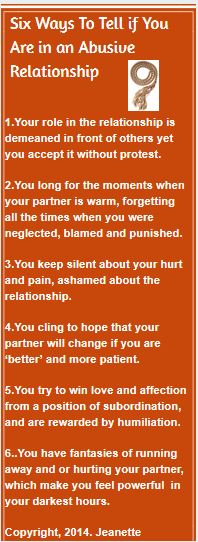Anger and Stress Management Tips for Satisfying Relationships
If you are in an abusive relationship you probably don’t know it.
You don’t recognize that your relationship is any different to others or to the one you grew up in.
So here is a twelve item checklist to help you discover whether you are in an abusive relationship, so you don’t have to suffer like the NFL’S Ray Rice’s wife Jany, Ray McDonald’s finance, Adrian Peterson’s daughter, or Greg Hardy’s domestic violence victims.
If only those victims could have been assertive and put themselves in an equal position in their relationships, they may have been less likely to be abused.
But when you feel powerless, insecure and stressed, it’s tough. Seeking therapy is too scary.
Twelve Item Checklist
1.You are verbally ridiculed but remain quiet.
2.You role in the relationship is demeaned in front of others yet you accept it without protest.
3.Your partner blames you when things don’t according to plan, you buy into it, and try harder to please next time.
4.You keep silent about your hurt and pain, ashamed about the relationship that you chose and are now trapped in.
5.You cling to hope that your partner will change if you are ‘better’ and more patient.
6.You try to win love and affection from a position of subordination, and are rewarded by humiliation.
7.You have fantasies of running away and or retaliating against your partner, which keep you going in your darkest hours.
8.You long for the moments when your partner is warm, to obliterate all the times when you were neglected, blamed and punished.
9. When your partner is loving it’s as if you are in heaven. You forget all the bad times, seeing only the nice side of your partner. You invest everything in the moment, feeling powerful that you and only you brought out the good stuff in your partner, that you always knew was there.
10. You are always ruminating on what you have said or done wrong to make sense of your partner’s emotional, physical or verbal abuse.
11. You protect your partner when other people comment on the way they behave.
12. You give up your autonomy and activities to keep your partner from getting anxious and angry about your living a life that is separate from them.
Next time I will write about how to help yourself if you are the victim of domestic violence.
copyright, Jeanette Raymond, Ph.D.
You might also like:
Imagine couples with Ray Rice and his Wife
How to be equal partners in your relationship
How to get your partner to admit they need professional help when they won’t admit their problems
Disclaimer: this article is for informational and educative purposes only. Dr. Raymond is not responsible for any reactions you may have when reading the content or using the suggestions therein. Interacting with this material does not constitute a therapeutic relationship with Dr. Jeanette Raymond


